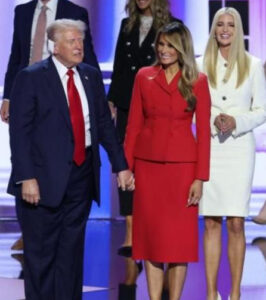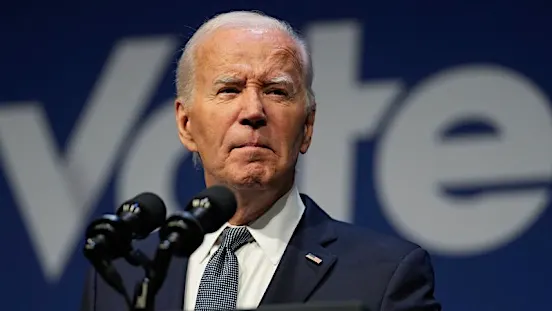The federal judge overseeing former President Donald J. Trump’s classified documents case threw out all of the charges against him on Monday, ruling that Jack Smith, the special counsel who filed the indictment, had been given his job in violation of the Constitution.
She also found that Mr. Smith had been improperly funded by the Treasury Department.
The ruling by Judge Cannon, who was put on the bench by Mr. Trump in his final year in office, flew in the face of previous court decisions reaching back to the Watergate era that upheld the legality of the ways in which independent prosecutors have been put into their posts.
It handed Mr. Trump a major legal victory two days after he was wounded in a shooting at a campaign rally and at the very onset of the political pageant where he is set to formally become his party’s presidential nominee.
The classified documents case, which is being heard in Federal District Court in Fort Pierce, Fla., once appeared to be the most straightforward of the four criminal prosecutions that Mr. Trump has faced. He was charged last year with illegally holding on to classified national security materials after leaving office and then obstructing government efforts to retrieve them along with two co-defendants, Walt Nauta and Carlos DeOliveira.
The charges against Mr. Nauta and Mr. DeOliveira were also tossed out. Mr. Smith’s office said he intended to appeal.
“The dismissal of the case deviates from the uniform conclusion of all previous courts to have considered the issue that the attorney general is statutorily authorized to appoint a special counsel,” said Peter Carr, a spokesman for the special counsel. “The Justice Department has authorized the special counsel to appeal the court’s order.”
But even if the appeal succeeds, the case still might never go in front of a jury.
It has long been clear that the documents case would not go to trial before the election in November, largely because of the glacial pace with which Judge Cannon has handled it. Should Mr. Trump be elected president again, he could simply have his Justice Department dismiss the case if it is reinstated on appeal — and even if he does not, longstanding Justice Department policy forbids prosecuting a sitting president.
But Judge Cannon’s decision to dismiss the indictment in its entirety at such a consequential moment in Mr. Trump’s campaign was nonetheless a remarkable development for the former president’s legal and political future, giving him further ammunition to portray the prosecution as an effort by President Biden and his allies to undercut him in the election.
In a statement on his social media platform, Mr. Trump said the decision dismissed what he described as a “Lawless Indictment.”
He wrote that the decision should be followed “quickly by the dismissal of ALL the Witch Hunts,” referring to the three other criminal indictments filed against him last year, as well as civil cases he has faced.
In her 93-page order — by far the longest she has written in more than a year of handling the documents case — Judge Cannon offered an in-depth look at her legal reasons for tossing out the charges. At the heart of her thinking was an assertion that no specific federal statute authorized the appointment of special counsels like Mr. Smith or gave them the “prosecutorial power” that they have wielded for 25 years.
Special counsels are currently governed by Justice Department regulations traditionally believed to have been based on a series of federal laws laying out the structure of the department and the powers of the attorney general. That has been the practice since 1999 when Congress allowed the Independent Counsel Act, which authorized and governed a different type of independent prosecutor, to lapse in the wake of the Whitewater investigation into President Bill Clinton.
But Judge Cannon took a wrecking ball to all of that, ruling that none of the statutes governing the conduct of attorneys general actually gave them the authority to appoint special prosecutors like Mr. Smith.
Moreover, she declared that allowing special counsels to operate under the control of the attorney general was a violation of the Constitution’s separation of powers. And she invited Congress to pass a new law if legislators wanted Mr. Smith to keep pursuing the case against Mr. Trump.
“If the political branches wish to grant the attorney general power to appoint Special Counsel Smith to investigate and prosecute this action with the full powers of a United States Attorney,” she wrote, “there is a valid means by which to do so.”
When the Independent Counsel Act was permitted to expire and was replaced by internal Justice Department regulations, there was a consensus in Washington that special prosecutors needed to be independent enough to handle sensitive political investigations without undue influence from powerful politicians, but not so independent that they would run amok and abuse their power.
In her ruling, Judge Cannon clearly sided with those who feared that special counsels like Mr. Smith were unchecked by sufficient accountability to the attorney general.
“The special counsel regulations impose almost no supervision or direction over the special counsel and give him broad power to render final decisions on behalf of the United States,” she wrote.
In their initial motion concerning Mr. Smith’s appointment, Mr. Trump’s lawyers had asked Judge Cannon to consider the related issue of whether the special counsel’s office had been improperly funded in violation of the Constitution’s appropriations clause.
The judge appeared to agree with that argument as well, writing that Mr. Smith had been “drawing funds from the Treasury without statutory authorization” and that “there is good reason to believe that the Appropriation Clause violation serves as a separate, independent basis to dismiss.”
Her decision to dismiss the case came two weeks after Justice Clarence Thomas expressed his own doubts about how Mr. Smith got his job in a brief concurrence to the Supreme Court’s landmark ruling granting Mr. Trump broad immunity against criminal prosecution.
The concurrence was unusual given that the question of Mr. Smith’s appointment was not under consideration by the court at the time and in fact was never raised in the case underlying the immunity ruling. That ruling stemmed from Mr. Trump’s other federal indictment — the one in Washington in which he stands accused of plotting to overturn the 2020 election.
Justice Thomas never mentioned Judge Cannon or the classified documents case in his concurrence. But he did recommend that “lower courts” look into the “essential questions concerning the special counsel’s appointment.” Last month, Judge Cannon did precisely that, holding two days of hearings in Fort Pierce on the issue of Mr. Smith’s appointment and funding.
The hearings were unusual, not the least because they covered in great detail what seemed to be settled legal ground.
Reaching back to the early 1970s, federal courts have repeatedly rejected efforts to question the legality of independent prosecutors like Mr. Smith. Those have included the Supreme Court upholding the appointment of Leon Jaworski, one of the special prosecutors who investigated the Watergate scandal, in a decision that was largely focused on the issue of President Richard M. Nixon’s claims of executive privilege.
Judges have also tossed out efforts to invalidate the work of special counsels like Robert S. Mueller III, who examined connections between Russia and Mr. Trump’s 2016 campaign, and David C. Weiss, who has brought two criminal cases against Hunter Biden, President Biden’s son.
In her ruling, however, Judge Cannon said that it was a “mistaken premise” to view Mr. Smith as “just another in a long line of ‘special attorneys’ of similar ilk.” She asserted that he was different from his predecessors for having come to the job as a private citizen and because he operated with “very little oversight or supervision.”
“In the end, there does appear to be a ‘tradition’ of appointing special-attorney-like figures in moments of political scandal throughout the country’s history,” she wrote. “But very few, if any, of these figures actually resemble the position of Special Counsel Smith.”
The decision to kill the classified documents case, and the hearing that preceded it, were hardly the first unorthodox moves Judge Cannon has made since she first took control of the case last June.
Over and over, she has issued rulings and taken procedural steps that have prompted second-guessing and criticism among legal scholars, many of whom have pointed out that she has been on the bench for less than four years and has limited experience in overseeing criminal trials.
She has often shown a willingness to grant a serious audience to some of Mr. Trump’s most far-fetched defense claims. And her penchant for scheduling hearings to consider questions that many federal judges would have dealt with on the merits of written filings alone has played into Mr. Trump’s strategy of seeking to delay the case for as long as possible.
Her decision about Mr. Smith’s appointment was also striking for the way in which it seemed to shut down any efforts by prosecutors to fight it outside of an appeal to a higher court.
Judge Cannon, for instance, appeared to foreclose the idea of Mr. Smith asking to file additional papers or to request that the issue be reheard. She noted that prosecutors had already been afforded a “full and fair opportunity to brief the matter.”
And she ended her ruling in a way that left no doubt about her intentions to end the prosecution.
“The Clerk is directed to CLOSE this case,” she wrote. “Any scheduled hearings are CANCELED. Any pending motions are DENIED AS MOOT, and any pending deadlines are TERMINATED.”
But she will not have the final word. Mr. Smith’s appeal will go initially to the 11th Circuit in Atlanta.
A three-judge panel from that court handed Judge Cannon a stern rebuke nearly two years ago, reversing a decision she made that favored Mr. Trump shortly after the F.B.I. searched Mar-a-Lago, his private club and residence in Florida.



































